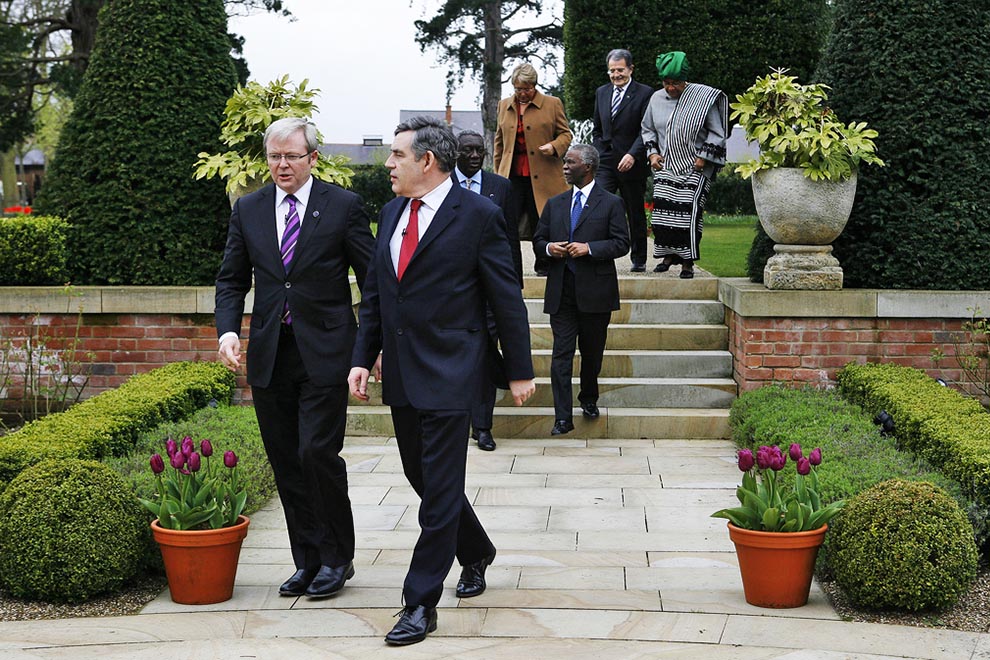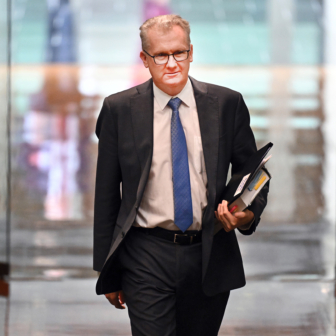KEVIN RUDD ended his first year in office much like John Howard ended his first twelve months in March 1997: still shiny, fresh and popular. It’s not that these new leaders have a special empathy with middle Australia or never put a foot wrong. It’s just that when a mistake is made it is ignored by the opinion polls and forgotten. The electorate is not really paying attention. On several occasions earlier this year, for example, opposition leader Brendan Nelson quite evidently wrong-footed the government, and after one particularly bad week in May Laurie Oakes wrote in News Ltd papers that “If Nelson does not get a bounce in the next Newspoll there is no justice.” Nelson didn’t get one, and there was none. New incumbency is like Teflon, for a while at least.
There are other similarities between our two most recent prime ministers. Both were disciplined, charisma-free opposition leaders who defeated incumbents believed to possess superhuman political skills. Fanatical pre-election “me-tooism” left each with little room once he got in. Both seemed uncomfortable moving from the empty populism of opposition to the demands of leadership. And as it took Howard several years to really get the hang of the job, it will take Rudd a while too.
There is, however, this difference. Both Howard and Bob Hawke (in 1983) came to power with a firm grasp of economics, which enabled them to nurture their novice treasurers. Rudd, on the other hand, got elected knowing little about economics while his treasurer, Wayne Swan, had spent three years as shadow treasurer – longer than either Paul Keating or Peter Costello did. The treasurer’s presentation skills will never approach those of the other two, but he probably came to office knowing more about his job than they did.
But perhaps the biggest difference between 1996 and 2008 is in the frame of mind of the opposition. Labor’s 1996 defeat was a little larger than the Coalition’s last year. Perhaps more importantly, the votes-in-seats equation meant the on-paper swing required for the Labor to regain office was more than double the one that faces the Coalition today. Government looked much further away twelve years ago.
As well, federal Labor is historically more comfortable in opposition. They know the introspection and despair well. Kim Beazley was never remotely challenged as opposition leader in that first term partly because he was an avuncular, unifying figure and also because no one else wanted the job. In 1996 the opposition knew they were out for two terms at least, and they got on with the job of pondering the meaning of life. When they looked up and – miracle of miracles – victory seemed possible, toppling Beazley would have made no sense.
Today’s opposition, by contrast, seems bitter and unreconciled with last year’s election loss. They’re onto their second leader and are odds on to be on a third by 2010. Conservatives don’t introspect well, and this crew doesn’t seem to understand the electoral dynamics of old versus new incumbency. They cling to the hope that the electorate will realise they got it wrong in 2007 and hand the country back. And if Australia goes into a deep, deep recession, they might be right.
So what of the future? The chances of a one-term government remain remote. In the longer term, Rudd will one day become unpopular and be toppled either by deputy Julia Gillard or the Australian people. In the shorter term, he will get better at his job and more comfortable wielding authority.
They say that disunity is death in opposition, but Robert Menzies was more correct when he said, as quoted by Tony Abbott in the Australian recently, that “defeat breeds disunity.” It wasn’t John Howard who kept the Coalition cohesive over the previous twelve years, it was being in government. Being in power means never having to navel-gaze. Don’t stand for anything? Who cares, you’re pulling the levers.
Howard and Rudd both saw their stature boosted by a global challenge, although at different times. Howard got terrorism five and a half years into the job; Rudd’s came after ten months, in the shape of the global economic meltdown. Each was inherently more suited to the other’s challenge: Howard the economics expert and international affairs novice and Rudd the opposite. But in the end it didn’t seem to matter, and indeed the “war on terror” added a supplementary dimension to Howard’s public persona. This appears to be happening for Rudd as well.
After its first year in office, the Howard government’s fortunes soured. Ministerial resignations accumulated and they seemed not to know what to do with themselves. Opinion polls turned unfriendly, and the prime minister’s September 1997 GST announcement was intended to elevate a drifting brand. But it was poorly sold and nearly cost him government.
Could Rudd’s trajectory take a similar turn? His first year saw no ministerial resignations. He hasn’t had to invent a cause; it was thrust upon him. But he is hostage to it. The danger lies in a collapsing economy, but I suspect that the government would only lose office over economic management if there was a perception of incompetence as well.
So far, the obsessive control of ministers by the prime minister’s office seems to have avoided the second part of that equation. But does this carry its own dangers? We may know the answer this time next year. •





